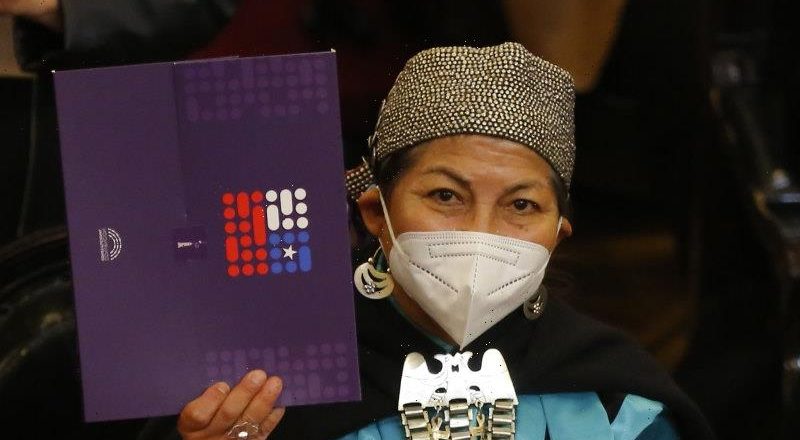New constitution recognising Indigenous people ready for Chilean vote
Santiago: Chile’s President Gabriel Boric has been presented with the formal draft of a proposed constitution meant to replace the one imposed by a military dictatorship 41 years ago and usher in fundamental changes for the South American country.
In the first of the draft’s articles, Chile is described as a “a social and democratic state” as well as “plurinational, intercultural and ecological”.
The document recognises the existence of 11 Indigenous groups, which represent 12.8 per cent of the country’s 19 million inhabitants.
Mapuche activist and former president of the Constitutional Convention Elisa Loncon shows the draft of the new Chilean constitution, a year after its authors met for the first time.Credit:Getty Images
Among other things, it requires a new public healthcare system and a process to return land to Indigenous peoples. It also lays out new rights, including the right to “adequate and dignified housing” and equal pay for equal work between men and women.
Chileans are to vote in a September plebiscite whether to adopt the charter, which was drawn up by a Constitutional Convention made up of 155 elected representatives – equally divided between men and women – and including 17 reserved Indigenous seats.
“This September 4th, it will once again be the people who will have the last word on their destiny,” Boric wrote on Twitter.
Chilean President Gabriel Boric holds up the final version of the country’s new constitution during a ceremony at the former Congress in Santiago.Credit:AP
The head of the convention, María Elisa Quinteros, handed the proposed new text with 388 articles to Boric in a formal ceremony. Boric then signed a decree setting the date for the plebiscite.
“I feel honoured to head up this historic moment,” Quinteros said.
More than three-fourths of voters called for a new constitution in a 2020 referendum, but the ceremonial handover of the draft comes at a time when people appear to be increasingly sceptical of the convention’s work.
Polls at the beginning of the year indicated a clear majority intended to vote in favour of the new constitution, but surveys since April have found a marked change in opinion, with those who oppose the new document appearing to be ahead.
Analysts say the arrogant attitude of some delegates to the convention rather than the content of the proposal has soured Chileans.
Giorgio Jackson, the presidency’s minister, alluded to that circumstance by saying that “we have seen a very bad evaluation of the process”.
During his speech on Monday (Tuesday AEST), Boric also urged Chileans not to consider the plebiscite a poll on his government. The vote “is not, nor should it be, an evaluation of the government. It’s the debate about Chile’s future and destiny,” he said.
Although Boric was sworn in less than four months ago with a high approval rating, recent surveys have shown Chileans growing increasingly sour on his administration amid an increase in crime and high inflation.
The document’s handover coincides with the dissolution of the Constitutional Convention a year to the date after it was set up, following widespread and often violent protests that paralysed the country and created a debate over a right to dignity.
If the draft is rejected in the plebiscite, the current constitution, written during Augusto Pinochet’s 1973-1990 dictatorship, will remain in effect even though there is widespread agreement that the country needs a non-military-aligned charter
If the document is approved by majority vote, it will launch a process that may take years to conclude. Congress would have to approve new laws to implement its requirements.
AP
Most Viewed in World
From our partners
Source: Read Full Article



